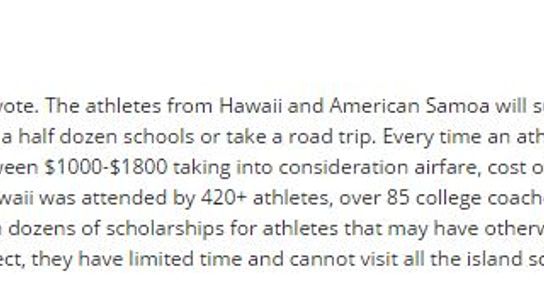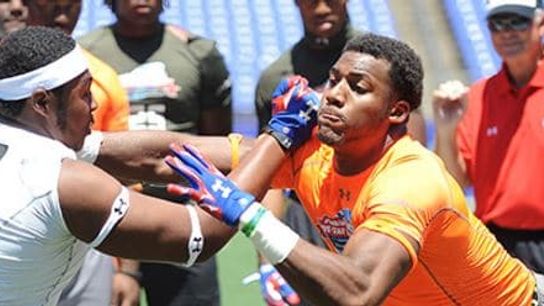The talk of the weekend, stretching through the day on Monday revolved around the NCAA's decision, based on conference votes, to ban satellite camps. It's been a hot topic issue that may folks are passionate about.
After talking with a number of people over the weekend, I decided to take a look at the issue from another angle - beyond it's impact on coaches - and asked what groups are most hurt by the ban on satellite camps.
1) Student athletes from low income households:
For thousands of student athletes, spending $1,000, $500, or even $200 to travel to a camp with the hopes to catch the eye of a college coach simply isn't an option. This is where most people, coaches included, have a problem with the rule change. Camps like Sound Mind Sound Body provided thousands of kids the opportunity over the years to show up from around the region, and lay it all on the line in front of college coaches with the dream of competing for an athletic scholarship. Those type of opportunities no longer exist under the new rules, and it's the kids that are hurt the most.
Sound Mind Sound Body fielded hundreds of questions via Twitter following the announcement of the ban from concerned parents (all of which they responded to privately via a DM), and it also had a number of players who had been presented an opportunity because of the SMSB camps reach out with their testimonials. Head here to see all of them.
2) Student athletes from Hawaii and America Samoa:
This one came to my attention after a reader commented on my article about Mike Leach sharing some choice words with the NCAA on the satellite ban. Before reading this I'd saw I was upset with the decision, but after reading it my mood quickly turned to a deep sense of disappointment.

Come to find out, the author of that comment (Doris Sulluvan) is the longtime President and Director of the Pacific Islands Alliance, a non-profit 100% volunteer run organization dedicated to helping Hawaii and American Samoa student athletes land college placements and scholarships.
3) Rural colleges and universities:
Washington State head coach Mike Leach presented another angle that many people don't see right away after the the announcement, pointing out how rural colleges and universities would pay the price much more so than schools located in, and around, major metropolitan areas. Take Wazzu for example and think about this for a second; to get to Pullman for a camp Mike Leach and his staff are holding for a reasonable price tag, a recruit is going to have to fly into Spokane, WA and then rent a car (meaning an adult of 25 or older will have to accompany them - $$$) and drive the hour and a half to the Pullman campus. That's not going to be cheap.
On the other hand, flying into Miami or Detroit for a camp with the 'Canes or Wolverines and catching a cab isn't near the headache. A few years ago the NCAA was so concerned maintaining "a level playing field" in recruiting that they deemed serving bagels with spreads like butter, jelly, peanut butter, and cream cheese an impermissible benefit. The ban on satellite camps makes the playing field anything but level.
4) Non-power Five schools:
For schools in the conferences like the MAC, Sun Belt, or Conference USA, satellite camps long provided coaches the opportunity to find talented players that had otherwise flown under the radar, or slipped through the cracks. These Non-Power Five Schools are the schools that are going to feel it the most. A program like Toledo is now going to have to convince kids to come to their camp so they can be evaluated by their coaches, rather than that being noticed by a Toledo coach at a camp just a short drive up the road at Michigan in Ann Arbor. Again, it's the kids that are really losing out here.
Sure, satellite camps needed some restructuring, but but this knee-jerk reaction to ban camps that have provided thousands of kids an opportunity that they wouldn't have had otherwise was not the right call, and you'll never convince me otherwise.
